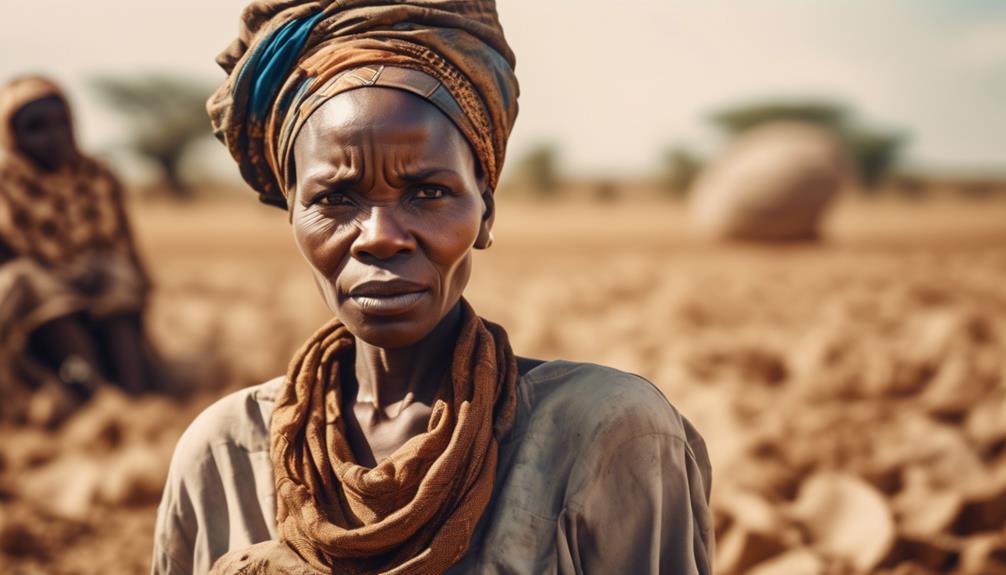Are you aware of the unique challenges that African women entrepreneurs face in the midst of climate change?
Climate variability and its impact on businesses across Africa, coupled with gender inequalities, create a perfect storm of vulnerability for women entrepreneurs.
From agriculture to urban areas, the effects of climate change disrupt livelihoods and business operations, but it is the women who are disproportionately affected.
In this discussion, we will explore the specific challenges faced by African women entrepreneurs, the factors contributing to their vulnerability, and the strategies needed to address gender inequalities and ensure their inclusion in decision-making processes.
Brace yourself as we unravel the risks and opportunities that lie ahead for these resilient and determined entrepreneurs.
Key Takeaways
- Over 50% of the African labor force works in agriculture, making them highly vulnerable to climate variability and change.
- Women entrepreneurs in Africa are often concentrated in sectors and businesses that are sensitive to climate, such as agriculture, livestock, fishing, trading, and processing.
- Women entrepreneurs face barriers to adapting to climate change, including discrimination in accessing finance, markets, technologies, information, and policies.
- Gender inequalities across the business environment need to be addressed to avoid climate change exacerbating existing disparities and women's inclusion in adaptation and business decision-making forums should be prioritized.
Impact on African Business Sectors
The impact of climate change on African business sectors is significant and poses numerous challenges for entrepreneurs. The economic implications are vast, as over 50% of the African labor force works in agriculture, which is highly exposed to and dependent on climate variability and change.
Climate hazards disrupt processing, manufacturing, transportation, and service provision, leading to decreased productivity and increased costs. To address these challenges, adaptation strategies are crucial. Entrepreneurs need to implement climate-smart agriculture practices, such as crop diversification and water management techniques, to enhance resilience.
Investing in renewable energy sources can mitigate the risk of unstable power supplies. Additionally, developing climate-resilient infrastructure and ensuring access to finance and insurance for businesses can help mitigate the economic impacts of climate change.
Vulnerability of Women Entrepreneurs
As we shift our focus to the vulnerability of women entrepreneurs in the face of climate change, it becomes evident that their unique challenges and barriers must be addressed to ensure their resilience and success in the business environment.
Women entrepreneurs face specific barriers to adaptation and limited access to resources that hinder their ability to cope with the impacts of climate change. Here are three key factors contributing to their vulnerability:
- Discrimination and limited access: Women entrepreneurs often face discrimination in accessing finance, markets, technologies, information, and policies. Limited ownership of agricultural land further compromises their access to resources necessary for business development and adaptation.
- Concentration in climate-sensitive sectors: Women entrepreneurs are often concentrated in sectors such as agriculture, livestock, fishing, trading, and processing, which are particularly sensitive to climate change. This makes them more susceptible to climate shocks and disruptions.
- Household-level responsibilities: Women entrepreneurs aren't only responsible for managing their businesses but also for managing climate risks at the household level. This additional burden increases their vulnerability to the impacts of climate change.
To address these challenges, it's crucial to address gender inequalities in entrepreneurship, provide targeted support and resources, and ensure women's inclusion in decision-making processes. By doing so, we can empower women entrepreneurs to adapt to climate change and enhance their resilience in the business environment.
Factors Contributing to Vulnerability

Factors contributing to vulnerability among women entrepreneurs in the face of climate change include cultural norms, limited access to resources, and discrimination in the business environment. Cultural norms and gendered discrimination influence the sectors and businesses in which women entrepreneurs work, often confining them to climate-sensitive industries such as agriculture and fishing. Discrimination in the business environment reinforces barriers to adaptation and exacerbates women's vulnerability to climate change. Limited access to finance, markets, and technologies further hinders women's business development and their ability to adapt to changing climatic conditions. Additionally, women's ownership of agricultural land is significantly lower than men's, compromising their access to resources necessary for business development and adaptation. Addressing these factors is crucial to ensuring the resilience and success of women entrepreneurs in the face of climate change.
| Factors Contributing to Vulnerability |
|---|
| Cultural norms and gendered discrimination |
| Limited access to resources |
| Discrimination in the business environment |
Addressing Gender Inequalities in Entrepreneurship
Addressing gender inequalities in entrepreneurship is crucial for promoting the resilience and success of women entrepreneurs in the face of climate change. To support women's access to finance and markets and promote gender-responsive policies and programs, the following steps can be taken:
- Supporting women's access to finance: Ensuring that women's businesses, including informal enterprises and individual producers, have equal opportunities to access business finance is essential. This can be achieved by providing financial support specifically tailored to the needs of women entrepreneurs and by making financing options inclusive and accessible.
- Promoting gender-responsive policies and programs: Designing policies, programs, products, and services that consider women's specific and diverse needs is crucial. Women's involvement should be central to the design of adaptation and entrepreneurship planning to level the playing field. Additionally, private sector involvement in adaptation action should prioritize equitable business linkages, including with women-owned businesses.
- Encouraging equitable business linkages and partnerships: Support is needed to help companies develop equitable business linkages and partnerships with a wider range of businesses, including those without formal land entitlements. This will help women entrepreneurs overcome barriers to accessing markets and technologies, ultimately promoting their business development and adaptation to climate change.
Ensuring Women's Inclusion in Decision-Making

To ensure the effective inclusion of women in decision-making processes, it's essential to prioritize their participation and representation in policies, programs, and forums related to adaptation and entrepreneurship planning.
Women have been underrepresented in these forums, limiting their ability to contribute to solutions and exacerbating existing gender inequalities. To address this, women's participation in the design of policies, programs, products, and services must be prioritized.
This can be achieved by creating inclusive spaces that allow women to voice their concerns, perspectives, and ideas. Additionally, financing options should be inclusive and consider the needs of women entrepreneurs, ensuring equal access to resources and opportunities.
Private sector involvement in adaptation action should promote equitable business linkages, providing women entrepreneurs with the necessary networks and collaborations to thrive.
Frequently Asked Questions
How Does Climate Change Specifically Impact Urban Businesses in Africa?
Climate change impacts urban businesses in Africa through disruptions to agriculture and tourism. Unstable water and power supplies, extreme heat, and flooding pose challenges. These hazards affect processing, manufacturing, transportation, and service provision, increasing the risk of unsafe working conditions.
What Are Some Specific Challenges That Women Entrepreneurs in Africa Face in Adapting to Climate Change?
Gender disparities exacerbate the challenges faced by African women entrepreneurs in adapting to climate change. Financial exclusion limits their access to resources, while cultural norms and discrimination hinder their ability to overcome barriers to adaptation.
How Does Cultural Norms and Gender Discrimination Affect the Sectors and Businesses in Which Women Entrepreneurs Work?
Cultural norms and gender discrimination shape the sectors and businesses where women entrepreneurs work. Climate change exacerbates these challenges, putting African women entrepreneurs at risk and hindering their ability to adapt and thrive.
What Are Some Specific Barriers That Women Entrepreneurs Face in Accessing Finance, Markets, and Technologies?
Some specific barriers you face as a woman entrepreneur include limited access to finance, markets, and technologies. Strategies to support you with restricted land ownership include inclusive business finance opportunities and equitable business linkages.
How Can the Private Sector Promote Equitable Business Linkages and Support Women Entrepreneurs, Including Those With Restricted Access to Formal Land Ownership?
To promote equitable business linkages and support women entrepreneurs, including those with restricted access to formal land ownership, the private sector must prioritize inclusive growth and empower rural women entrepreneurs through targeted policies, financing options, and partnerships.
Conclusion
In conclusion, African women entrepreneurs face significant challenges due to climate change. These challenges include limited access to finance, markets, and technologies necessary for adaptation.
However, there are solutions to address these gender inequalities and ensure their inclusion in decision-making. For example, in Kenya, a group of women farmers formed a cooperative. This cooperative allowed them to access climate-smart technologies and markets for their produce. As a result, they experienced increased resilience and income.
By empowering women entrepreneurs and providing them with the necessary resources, we can create a more sustainable and inclusive future for Africa.





